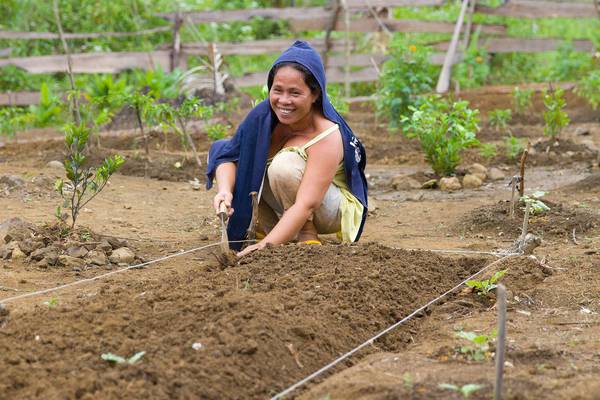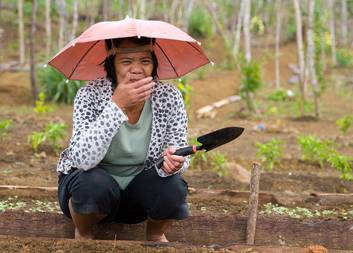Squatting, chattering and plucking weeds from the garden. What is pain for one can become a hobby and change of lifestyle for group of Philipine women. “Here are eggplants, sweet potatoes, tomatoes and there are papayas and traditional citrus fruit calamondin,“ points Zaltia Macatimpag proudly toward plants. She is in charge of a collective organic garden and tends it together with more than forty women.
A garden about as wide as half a football field was established by local women last summer. Financial support  was provided by Caritas Czech Republic who have been trying to improve local people’s living condition since Typhoon Hayan hit the Philippines in September 2013.
was provided by Caritas Czech Republic who have been trying to improve local people’s living condition since Typhoon Hayan hit the Philippines in September 2013.
Free fruit and vegetables grown without chemical fertilizers is one of the many things appreciated by families involved with Caritas organic and agricultural programme. Moreover, women learn how to make compost and their own fertilizers which they can use in the garden or try to sell to increase their family budget. Excess harvest can also become a family’s source of income.
The fact that the majority of women spend one day a week working in a collective garden or starting their own organic gardens is testament to their interest. “Most of us grow our own vegetables, in our backyards. We know how to make our own organic fertilizers and how to grow fruit and vegetables without chemicals after gardening lessons organized by Caritas. It’s cheaper and healthier." Editha Bayarong, who is fifty-two years old, spoke highly of the project.
However, getting a project like this started is not so easy. “Sometimes someone would forget to water plants. It’s a problem especially during hot days. Young plants would fade and we suffer big losses. I’m trying to convince other women to take their task seriously, to think about others and learn the most from it at the same time” said Zaltia, who also coordinates work tasks.
Unfortunately, watering plants is not the only disaster troubling gardens. Last summer Typhoon Ruby (also known as Hagupit hit the Philippines on December 6 2014) destroyed one of the gardens in nearby village Panan Awan, which is also supported by Caritas Czech Republic. “We had to find another place for our garden after Ruby. The old one was completely flooded and water has taken all the plants away” was the situation as described by Zaltia. Fortunately, gardeners from Osmenia village rushed to help and offered better and more suitable place.
Both collective organic gardens are now next to each other. “It’s favourable for both groups. We can easily share tools and ideas. Moreover, the new garden has a water source, which is not common for Samar,“ added Zaltia.
Caritas Czech Republic contributed 337,000 Czech Crown to two organic gardens in 2014. All funds were used to buy young plants, seedlings, tools and training lessons for 80 women.







